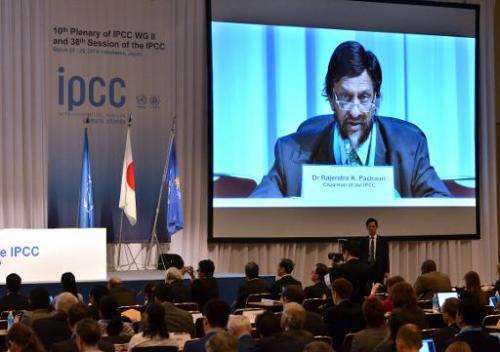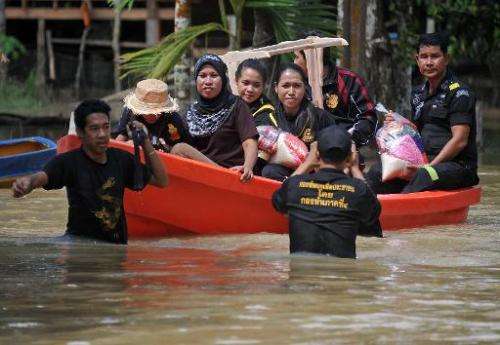Intergovernmental Panel on Climate Change (IPCC) chairman Rajendra Pachauri speaks at the 10th plenary of the IPCC Working Group II in Yokohama on March 25, 2014
International scientists on Tuesday kicked off a week-long meeting in Japan that is set to deliver dark predictions on the impact of climate change, warning of severe floods and droughts that could spark conflict and wreck economies.
Their report, set to be released on March 31, is part of a massive overview by the United Nations' Intergovernmental Panel on Climate Change (IPCC) that is likely to shape policies and climate talks for years to come.
Scientists and government representatives are meeting in Yokohama, south of Tokyo, to hammer out a 29-page summary that will be released at the end of the conference along with the full report.
A leaked draft of the report seen by AFP warns that rising greenhouse gas emissions will "significantly" boost the risk of floods—with Europe and Asia particularly exposed—while droughts will suck away renewable water supplies.
"Hundreds of millions" of coastal dwellers around the world will be displaced by the year 2100, the draft warns, while the competition for dwindling resources could even spark violent conflicts.
"I think everybody who works on the climate issue understands that climate change is truly one of the defining challenges of the 21st century," Chris Field, of the United States' Carnegie Institution for Science, told the event's opening ceremony.
But Field, who led the study, said the UN's climate panel was "uniquely positioned" to enable policymakers to "deal effectively, robustly and optimistically with challenges for the future".
The report will be the second of three long-awaited IPCC studies on climate change. The first, released last September, declared that scientists were more certain than ever that humans caused global warming.
That report warned that temperatures could climb by up to 4.8 degrees Celsius (8.6 degrees Fahrenheit) this century, raising sea levels and increasing the risks of weather-related catastrophes.
The new draft warns of food crises that could be sparked by climate change, with wheat, rice and corn yields all set to fall—while demand for crops is likely rise sharply as the world's population grows.
Costs will spiral with every degree that the temperature goes up, although it is hard to forecast by how much, it says.
But by reducing carbon emissions "over the next few decades", the world can stave off many of the worst climate consequences by century's end, says the report.
Thai villagers take a boat to get government food packs during floods in the southern Narathiwat province on December 6, 2013
'At a crossroads'
Environmental groups at the conference in Yokohama renewed their call for action.
"While the IPCC report will make grim reading, the key message here is choice," said Greenpeace campaigner Kaisa Kosonen.
"Will we continue drifting from one disaster to another, or will we take control of our future? We're at a crossroads and the choices we make now will determine how history judges us."
Winnie Byanyima, executive director of Oxfam International, warned that climate change's impact on food production would hamper efforts to end poverty.
"It could have grave consequences for what we all eat, but the world is woefully underprepared for it," she said.
The IPCC document will spell out the consequences of climate change and opportunities for the future, said Field.
The panel has issued four previous "assessment reports" in its quarter-century history.
The Yokohama document—the second instalment of the fifth assessment report—goes further than its predecessors in forecasting regional impacts in greater detail and emphasising the risk of conflict and rising seas.
IPCC chairman Rajendra Kumar Pachauri said the conference would be of "enormous value".
"This working group report will now enhance our understanding of issues related to impacts, vulnerability, and adaptation in the field of climate change," he said at the start of the meeting.
"Of particular significance is detailed assessment of regional aspects which will give us much clearer understanding of impacts in the past, and those projected for the future in different regions."
The IPCC's last big report in 2007 helped unleash political momentum leading to the 2009 UN climate summit in Copenhagen. But its reputation was dented by several mistakes, seized upon by climate sceptics as proof of bias.
© 2014 AFP
























